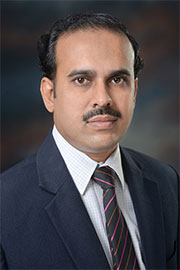Thyroid diseases are gradually increasing in India worldwide. Also, several myths are prevalent among the general public regarding thyroid diseases. Thyroid diseases are 5-10 times more common in women as compared to men. Diseases affecting the Thyroid gland can be divided into two types: 1) Diseases affecting the structure of the gland which produces thyroid swelling or “Goitre” and 2) Diseases which affect the functioning of the thyroid gland i.e. low or high thyroid function. Some patients may have both the problems simultaneously.
The Thyroid gland is an endocrine (ductless) gland located in front of the neck. Thyroid hormones (T4 and T3) are secreted by this gland. These hormones are responsible for many important functions such as growth, metabolism, nerve function, memory and sexual function, including child birth. Thyroid Stimulating Hormone (TSH) is a regulatory hormone of the thyroid secreted from the pituitary gland. Thyroid disease in addition to the direct health effects like poor heart function and high cholesterol also affects quality of life, performance at work and economic productivity of the individual. Proper thyroid function is also essential for normal reproductive function especially in young women wanting to have children. It is essential for women to have their thyroid tested if they have irregular periods or have difficulty in getting pregnant. Pregnant ladies should undergo thyroid blood test as early as possible to avoid complications for themselves and for the unborn baby.

How to detect abnormal thyroid function?
When you are concerned that you may have a thyroid problem please consult an Endocrinologist for a full physical examination focussing on heart, neurology, skin and eye. This should be followed by a blood test which includes thyroid hormones (T4 and T3) and TSH. Also, some patients with Goitre may require ultrasonography of the Thyroid. Tests should be interpreted by an Endocrinologist who has a wide experience and knowledge in treating thyroid disorders.
Hypothyroidism (Low thyroid function)
Hypothyroidism or low thyroid function is the most common thyroid problem. This disease happens most commonly due to a mechanism called “Autoimmunity”. Antibodies are produced by our own body to fight against common viral or bacterial infections. These antibodies attack our own thyroid gland and alter its structure and function (Autoimmunity). Contrary to the popular belief, iodine deficiency does not play a role in this.
Common symptoms of low thyroid function
- Unexplained weight gain
- Menstrual irregularities
- Tiredness
- Constipation
- Loss of hair
- Brittle nails
- Forgetfulness
- Cold intolerance
- Loss of appetite
- Swelling of legs
- Dry skin
Blood tests help to diagnose low thyroid function. If a patient is having hypothyroidism, she or he can lead a normal healthy life by taking Thyroxine tablets regularly. Patients need regular follow-up with an Endocrinologist and periodic blood check-ups to know if their thyroid hormone levels are normal and also to know if they are taking the correct dosage of Thyroxine.
Hyperthyroidism (High thyroid function)
Hyperthyroidism is a less common problem compared to hypothyroidism. Patients often present with severe anxiety or significant weight loss. Irritability, muscle weakness, poor sleep, enlarged thyroid gland, redness of eyes, protrusion of the eyes and increased feeling of heat could be related to an overactive thyroid gland. The majority of high thyroid function cases can be treated with medicines. Radioactive iodine treatment is the current standard of care for a permanent solution for high thyroid function all over the world. Surgery is not necessary for most thyroid problems. Thyroid disorders are completely treatable, and patients will be able to return to normal life if appropriately managed.
Myths vs. Facts
Myth – Thyroid disease is very dangerous
Fact – Thyroid disease is easily treatable
Myth – You cannot lead a normal life with thyroid problems
Fact – You can lead a normal life with thyroid problem, if you take treatment regularly
Myth – Patients with Hypothyroidism (Low thyroid function) should avoid many vegetables
Fact – There is no special diet for Hypothyroidism
Myth – Surgery is the only treatment for many Thyroid problems.
Fact – Surgery is not required for many Thyroid problems. They can be treated by medicines alone.

Article by Dr. R. Bharath, MBBS, MD (Gen Med) DNB (Endo)
Senior Consultant Endocrinologist & Diabetolgist
Kauvery Hospital

